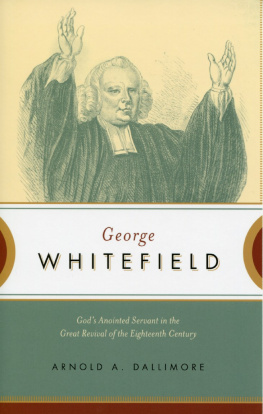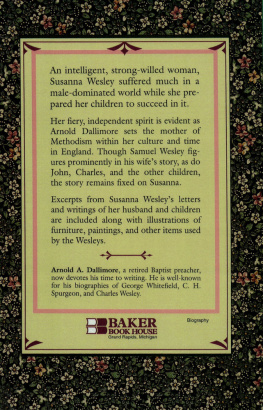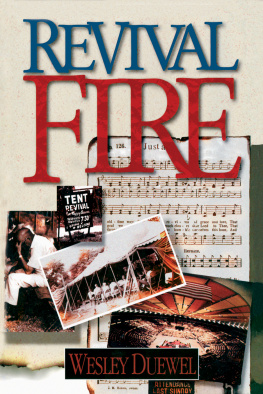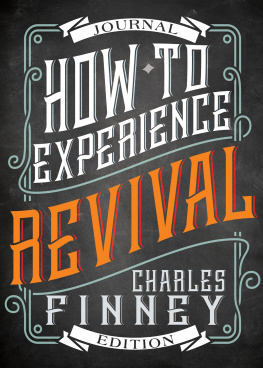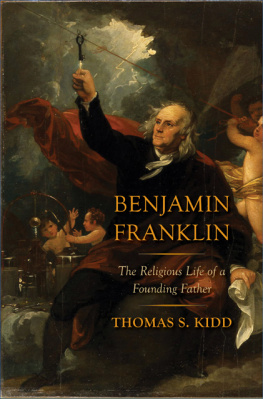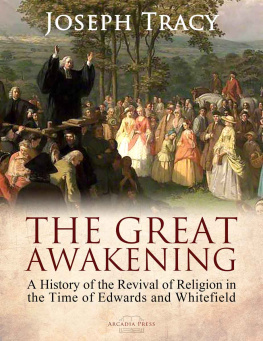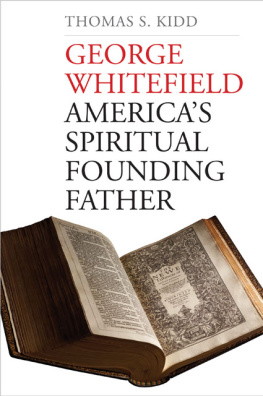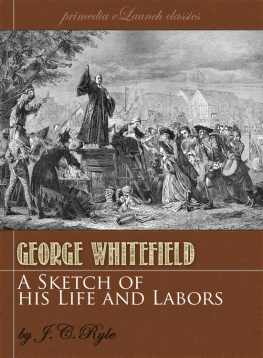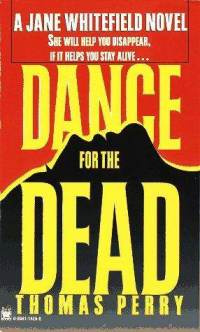George
W H I T E F I E L D
George Whitefield: God's Anointed Servant in the Great Revival of theEighteenth Century. Adapted, rewritten and abridged from the two-volume work published previously under the title: George Whitefield: The Life andTimes of the Great Evangelist of the Eighteen-Century Revival.
Copyright 1990 by Arnold A. Dallimore
Published by Crossway
1300 Crescent Street
Wheaton, Illinois 60187
All rights reserved. No part of this publication may be reproduced, stored in a retrieval system, or transmitted in any form by any means, electronic, mechanical, photocopy, recording, or otherwise, without the prior permission of the publisher, except as provided by USA copyright law.
First printing, 1990
Reprinted with new cover 2010
Cover design: Josh Dennis
Cover photo: The Bridgeman Art Library
Printed in the United States of America
Library of Congress Catalog Card Number 89-81258
Trade Paperback ISBN: 978-1-4335-1341-1
Crossway is a publishing ministry of Good News Publishers.
VP 19 17 16 15 14 12 10
1 12 11 1 0 9 7 6 5 4 2
For the preaching of the cross is to them that perish foolishness; but unto us which are saved it is the power of God.
For after that in the wisdom of God the world by wisdom knew not God, it pleased God by the foolishness of preaching to save them that believe.
And I, brethren, when I came to you, came not with excellency of speech or wisdom, declaring unto you the testimony of God.
For I determined not to know any thing among you, save Jesus Christ, and him crucified. And I was with you in weakness, and in fear, and in much trembling.
And my speech and my preaching was not with enticing words of man's wisdom, but in demonstration of the Spirit and of power:
That your faith should not stand in the wisdom of man, but in the power of God.
The Apostle Paul
1 Corinthians 1 and 2 |
Table of Contents
If ever philanthropy burned in the human heart with pure and intense flame, embracing the whole family of man in the spirit of universal charity, it was in the heart of George Whitefield. 'He loved the world that hated him.' He had no preferences but in favour of the ignorant, the miserable and the poor. In their cause he shrank from no privation, and declined neither insult nor hostility. To such wrongs he opposed the weapons of an all-enduringmeekness and a love which would not be repulsed. The springs of his benevolence were inexhaustible and could not choose but flow.
Sir James Stephen
Essays in Ecclesiastical Biography
1883 |
I am thankful for the reception accorded my two-volume work, George Whitefield: The Life and Times of the Great Evangelistof the Eighteenth-Century Revival. Although each volume of this work amounts to six hundred pages, it has had several printings and has been widely read. Readers in various countries have expressed their gratitude for the information and fascination these books provided. For instance, Dr. Cornelius Van Til of Princeton and Westminster Seminaries in reviewing Volume One stated,
Read this book. You may forget to talk to your wife (or husband); you may forget to go to work; but it's worth a few sacrifices.
Why do I go to such extremes? To talk like that is surely abnormal. Yes, it is. But I did get into an unusually abnormal state of mind when I read the book. Besides, I am even now, weeks later, still abnormal.
Notwithstanding the large circulation these books have received, many potential readers, lacking a realization of the interest they would find in them, have told themselves, "Two such large volumes would be too much for me." Accordingly I have condensed the two volumes into one of less than three hundred pages. This book, though brief and simple, reports many of the memorable and exciting matters of Whitefield's life, and I have endeavored to write in a style that I hope will prove abundantly interesting, even to many who are not in the habit of reading.
I trust, however, that readers of this one-volume work, gaining instruction and blessing from its pages, will be influenced to read the two-volume record of the life and times of George Whitefield, the greatest evangelist since the Apostle Paul.
Arnold A. Dallimore
Cottam, Ontario,
Canada, NOR 1B0
Many Whitefield biographers present his life as an enigma which cannot be explained. This is largely due to a failure to recognize the character of his boyhood environment.... Whitefield came from a clerical, educated and cultured ancestry.
Edwin Noah Hardy
George Whitefield, the Matchless Soul-winner |
1
Born and Born Again
G eorge Whitefield was born in 1714 in The Bell Inn at Gloucester. A three-story structure with a breadth of some two hundred feet, a busy dining room and tavern, it was the finest hostelry in all that part of England. Its Great Room was used for entertainments and the staging of plays, and several outstanding people were among its patrons.
Under the hand of Thomas Whitefield, George's father, The Bell prospered. The Poor Rate charged against himan indicator of a man's incomewas as high as that of anyone in the parish and twice as high as most.
Thomas and his wife Elizabeth had each been brought up in comfortable circumstances. For some years Thomas's father had lived retired on a country estate, and there Thomas had spent his boyhood. Elizabeth came from two respectable Bristol families, several of her relatives filling important civic offices, and the wills written by some reveal that they were very well off.
The Whitefields saw not only their business prosper, but their family too. There were born to them first five boys, then a girl, and finally the boy they named "George." The home was of an upper-middle class character, and the family was among Gloucester's more prominent citizens.
When George was a child of two, however, his father passed away. His mother took over the management of the Inn, and the business continued to prosper. The Poor Rate that she paid remained at its high level.
Whitefield's first biographer, Dr. Gillies of Glasgow, says: "He was regarded by his mother with a peculiar tenderness, and educated with more than ordinary care." After being put to school at an early age, he attended a school known as "The College," associated with Gloucester Cathedral. At the age of twelve he was enrolled at the school attached to the Whitefields' parish church, St Mary de Crypt. There he first revealed a native eloquence and was chosen to make speeches before the City Council when it visited the school.
What kind of boy was George Whitefield? We have some knowledge of his boyhood from an Account that he wrote later, in which he describes his early years. Like John Bunyan and several other outstanding Christians, he undoubtedly exaggerates his tendencies towards evil. Its opening paragraphs read:
I can truly say I was brutish from my mother's womb. Lying, filthy talking, and foolish jesting I was much addicted to. Sometimes I used to curse, if not swear. Stealing from my mother I thought no theft at all. Numbers of Sabbaths have I broken, and generally used to behave myself very irreverently in God's sanctuary. Much money have I spent in plays. Cards and reading romances were my heart's delight. Often have I joined with others in playing roguish tricks.

